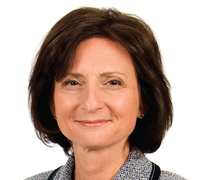Much of the pride and satisfaction of my job comes from assisting and supporting others in their professional ambitions and career growth. In my experience, the most effective mentoring relationships thrive only in the presence of mutual respect between two individuals. Fortunately, in my career, I was the beneficiary of several strong mentoring relationships, and they have fueled my interest in being a mentor for others. In all cases, my mentors had a significant influence on me. Each mentor was a person whom I admired for his or her abilities and achievements. I learned from each of them the importance of setting challenging goals and persisting in the pursuit of those goals within a framework of principled values.
My father was my first mentor. As a young teenager, I recall confiding in him my desire to be a lawyer. He not only encouraged my interest in the law, but also instilled in me the belief that my aspiration was achievable. He taught me that if I sincerely wanted something and was willing to devote myself to attaining it, I would be successful. My father’s philosophy—to understand first the direction in which one wants to travel and then to focus all of one’s energy on that journey—has helped me throughout my career.
Successful mentoring begins with respect and trust, which can only be established if the mentor keeps promises and is honest and candid. The expression of a sincere desire to help another person achieve his or her potential also goes a long way in constructing a strong mentoring bond. Asking the right questions and listening to the answers are also critical. And, of course, well-timed praise and constructive criticism play important roles as well.
Through coaching and mentoring, I am able to give back and, in a sense, pay tribute to the mentors who have coached me. I would like to think that through my coaching and mentoring I have helped, and will continue to help, others achieve their professional potential. In the end, one of the measures of my success as a mentor will be whether the beneficiaries of the relationship are inspired to become mentors themselves.







